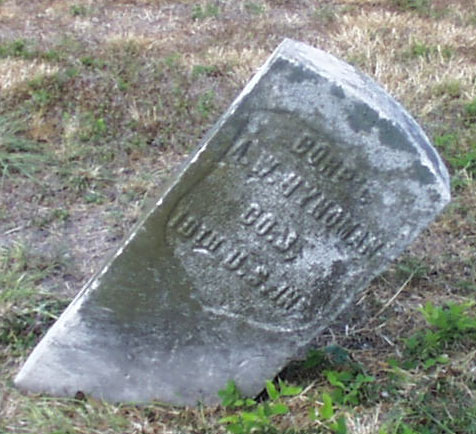A. W. Hyndman
Corp'l
A.W. Hyndman
Co. J.
10th U.S. Inf.

Photo Credit: Rosa G. Gonzales
Biography
Andrew W. Hyndman was a corporal of Company J of the 10th U. S. Infantry who was born about 1932 in Sherbrooke, Canada (probably the major city in Quebec Province that is near the United States border). According to his military records in the National Archives of the United States, Andrew enlisted at Fort Snelling on December 1, 1868 to serve for three years. This may actually have been a re-enlistment since he gives his occupation at the time as that of “soldier�. Fort Snelling was in the Minnesota area. It has served as a military outpost as early as 1819 and was a center for training thousands of volunteers for the Union Army between 1861 and 1865. In his enlistment papers, Andrew is described as 36 years old, with blue eyes, brown hair, fair complexion, and a height of 5 feet, eight inches. In his declaration as a recruit he states that he has neither wife nor child so he would have been free to go wherever the military sent him and was probably making this his career. The U. S. Register of Enlistments reports that Andrew died “by drowning� on Corpus Christi Bay on September 4, 1869. Articles from the “Daily Ranchero� of Brownsville note that there were multiple drownings from the 10th Infantry at about that same time. An article of August 26, 1869 (page 1, column 1) states that six soldiers were sailing at Brazos Santiago when their boat capsized and one drowned. Anther article in the “Daily Ranchero� of September 4, 1869 (same day Andrew also met his fate) notes on page 2, column 3 that another soldier from the same regiment had drowned only two days before. The article laments, “It is always sad to hear of men loosing (sic) their lives by accident, but it seems to us more so in the case of a soldier, who we imagine would much rather meet his fate on the battlefield, against this country’s foes.� Andrew and others from the 10th Infantry may have sought some recreation on the beautiful waters of the Gulf Coast, but in many cases they must have been unprepared for the undertoes and other dangerous currents that could take their lives. Andrew died far from his native land and not in battle, but the sacrifices he made in service to his adopted country should not be forgotten. He had to spend much of his career in frontier areas that were as rough and threatening as any human foe might be.
Research and transcription: Michael A. Howell